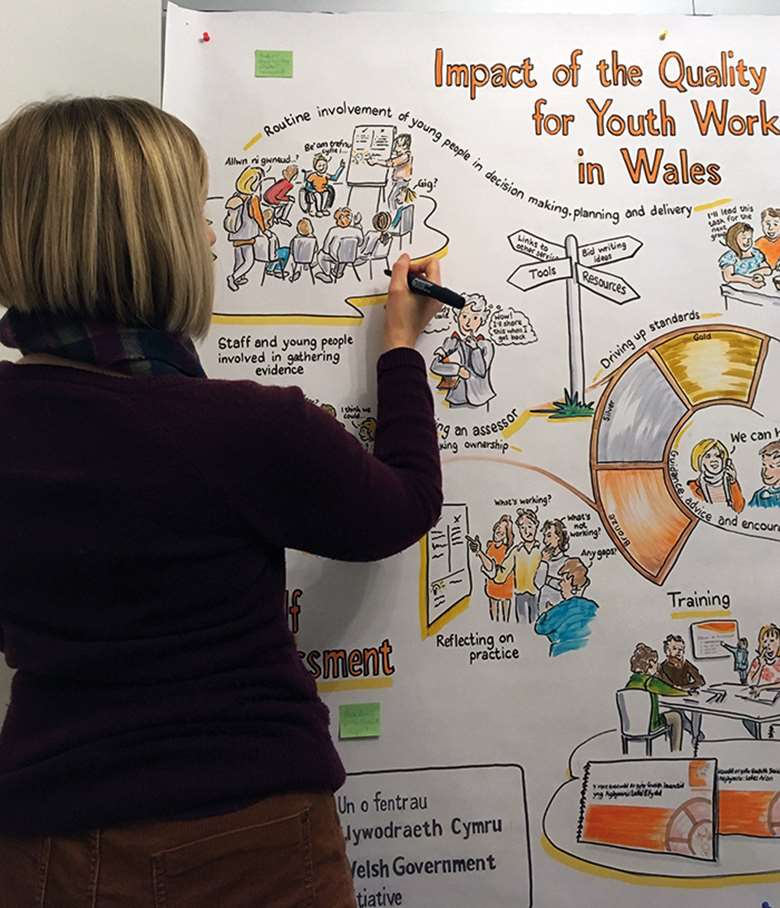Youth work quality mark
Jo Stephenson
Tuesday, July 31, 2018
Scheme offers independent assessment of the quality and performance of Welsh youth work organisations.

- It is funded by the Welsh government and free for organisations to take part
- 15 youth organisations have achieved an award with evidence the scheme helps them demonstrate impact
ACTION
While it is clear quality youth work makes a real difference to young lives, this can sometimes be hard to demonstrate. This is in part why the Welsh government launched a quality mark scheme, also designed to provide a consistent set of standards and definition of quality across the sector in Wales.
The scheme was initially piloted with four youth work organisations over 18 months. In June 2016, the contract to roll out the scheme was awarded to specialist children's and youth services consultants Atkin Associates, founded by Louise Atkin.
With separate inspections of youth services a thing of the past, the scheme was about having a national benchmark, says Atkin, a former inspector of youth services for Ofsted. Deep cuts to youth services across the border in England were also a factor, she says.
"There have been cuts to youth work in Wales, but not on the same scale as there have been in England and I think part of it was about looking across to what was happening in England," she says.
"We know youth work makes a difference to young people, but we need to get much better at being able to evidence the impact."
The fact the scheme was very much shaped by the sector itself, with the government adamant it should cut across statutory and voluntary provision, was key, adds Atkin. Fully funded by the government, it has three levels – bronze, silver and gold – with organisations expected to work through the levels in order.
Each level comes with a set of different standards organisations must meet. For example, those aiming for gold must show they are effective at recording and, where appropriate, accrediting young people's achievements and progress. They are also assessed on their ability to manage information to plan, deliver and evaluate services and demonstrate cost-effectiveness, robust partnership work and good use of resources.
Participants working towards each level undertake a detailed self-assessment exercise and provide evidence, but, crucially, the scheme also involves an assessment visit.
These typically take place over 24 hours with the three-strong assessment team arriving at lunchtime and meeting staff and young people. They will observe some daytime provision in action – often in schools – and will also visit evening activities, returning the next day for more meetings and observations.
According to Atkin, who was an assessor for the National Youth Agency's quality mark scheme, another key factor in the Welsh scheme's success is the fact assessors of services are senior people currently working in the youth work sector in Wales, including principal youth officers and quality assurance managers in councils, and senior managers and chief executives from charities.
"The fact projects are assessed by respected youth work professionals means the level of recognition within the sector is high and the scheme is valued," she says, as is the fact the scheme has strong ministerial support.
Young people are very much involved too. "A lot of kite marks are very much desk-based exercises and are simply paper trails," says Atkin. "But we always meet and talk to young people, and a lot of the organisations have involved them in preparing for the visit and in doing the self-assessment.
"One of the things that has been fed back to us is that young people feel really proud if their organisation gets the quality mark because they have been involved in the process and it matters."
IMPACT
To date, 15 organisations have achieved a bronze quality mark, with one progressing to silver and three achieving gold – the Cwmbran Centre for Young People, Pembrokeshire Youth, and the youth engagement and participation services in Rhondda Cynon Taf.
Nine of the 15 are local authority youth services, while six are voluntary organisations – spanning local projects to national charities. Meanwhile, 20 senior youth work practitioners have been trained as assessors to date.
An evaluation report on the first seven organisations to take part in the scheme found it was "resulting in improved management practice and face-to-face youth work with young people".
Organisations reported improvements to staff supervision, the involvement of young people, and the way they monitored and measured the impact of their work.
The majority said it had improved the quality of youth work practice and boosted morale among staff and service users
National youth work organisations now need to show they have achieved or are working towards a bronze to get government funding.
This article is part of CYP Now's special report on Youth Work Impact. Click here for more




